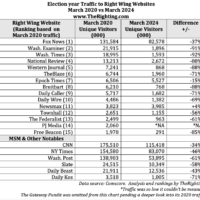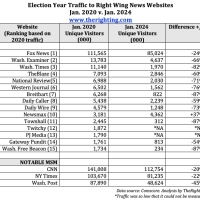
Americano Media Wants to be “Fox News in Spanish”
By Michael Lovito, May 17, 2023
Republicans believe the Latino vote is theirs for the taking, and that all they need to capture it is someone who literally speaks these voters’ language.
Americano Media hopes that it can be that someone. While a litany of news outlets, from the seemingly dormant El American to the currently in-flux Radio Mambi, may have strived to be “Fox News in Spanish,” the budding Miami-based broadcast empire has emerged in recent months with the most credible claim to that title.
The brainchild of Trump ally Ivan Garcia-Hidalgo, Americano Media has pursued a rapid expansion of its listener base and workforce over the past year and a half, reportedly seeking to broadcast its shows on 25 land-based radio stations as well as over-the-top (i.e., independent of cable) streaming television by the end of 2023. Executing such a large-scale market takeover is no small task – but Americano’s aggressive marketing strategy and Spanish-language conservative media’s current power vacuum have created the conditions necessary for the company to be a coast-to-coast success, and the potential to become a serious electoral force.
Subscriptions and Talent
Around 2020, Garcia-Hidalgo, a surrogate for Trump’s reelection campaign and a former telecommunications executive, began sharing cheaply produced news broadcasts from Washington via digital platforms like Facebook and YouTube. According to the Washington Post, one of his fans and interview subjects was Michael Caputo, a controversial Covid-era Trump advisor who was so impressed by Garcia-Hidalgo that he helped him secure a $1.2 million investment from Republican donor Tom Woolston, enough to launch a nascent version of Americano Media on Sirius XM in March of 2022.
Caputo was also able to persuade the former president to appear on the station for an interview, and the ensuing buzz attracted another investor, Doug Hayden. His cash infusion allowed Americano to begin building its television studio and ditch satellite radio in favor of the Audacy-owned WAXY-AM in Miami, later rebranded Radio Libre 790. As of this writing, Americano’s radio content now appears over the air on four other radio stations (three in Central Florida, one in Bakersfield, Calif.), while its TV shows appear on most major streaming providers and through an independent, subscription-based app. Americano is currently pursuing even more airspace and capital, with a goal of raising $30 to $50 million by the end of the spring.
Americano has also found early success poaching conservative Hispanic broadcast talent from other outlets. The recent purchase of talk-radio station Radio Mambi by an investor group backed by progressive billionaire George Soros spurred on an exodus of on air-personalities such as Lourdes Ubieta, Dania Alexandrino, and Nelson Rubio away from the once conservative station and into Americano’s studios, while the company’s digital team includes a number of former El American employees.
Other on-air hosts include former Nevada state assembly candidate Jesús Márquez, who hosts the popular “Battleground Americano” talk show, as well as up-and-comer Freddy Silva, who was singled out by Media Matters for America for his inflammatory commentary regarding immigration and LGBTQ+ issues. Even Florida Senator Marco Rubio has found a platform at Americano, publishing op-eds on the company’s website, which publishes articles in both Spanish and English that criticize “woke ideology,” left-wing Latin American governments, and other conservative targets.
Reason for Hope, Reason for Caution
In the runup to the 2022 midterms, reporting and analysis that suggested that Spanish-language disinformation was playing a major role in shifting the Latino vote right. Alejandro Alvarado, the Director of the Spanish-Language Journalism Master’s Program at Florida International University and a former producer, writer, and editor for TV stations like CBS Telenoticias and Univision, says that conservative Spanish-language media has had an unmistakable impact on recent elections, but that not all Latino voters need a fiery radio host to convince them to vote Republican.
“The Republican Party has been working very hard to win the Latino middle class, especially Latino small business owners, who naturally reject regulation and government intervention,” said Alvarado, who also noted that Latino immigrant groups who fled leftist governments tend to lean Republican as well. “There’s a strong foundation in Miami for doing that because of the large number of Cuban refugees, and now you have an influx of Venezuelans into South Florida as well. Donald Trump did an event at FIU during the pandemic, and it was packed with Venezuelans supporting him.”
Despite Americano’s rightward lean, Alvarado, who collaborated with his students, colleagues, and the Miami Herald on a project monitoring Spanish-language disinformation last year, said that he has reason to believe that the company might not be as vulnerable to the conspiracy-minded rhetoric that plagues its peers. Chief among them was Americano’s decision to hire Manuel Aguilera, a veteran of both Spanish and Latin American conservative news whom Alvarado described as a “serious investigative journalist” with a “strong reputation in the field,” as its VP and managing editor. But Alvarado also noted that, like its template Fox News, Americano will likely struggle to prevent its legitimate news gathering efforts from getting drowned out by its bombastic opinion shows.
“There’s tension within these organizations,” Alvarado said. “Yes, they favor right-wing politicians and governments, but I think Americano Media is trying to do serious journalism. But the talk shows are very emotional. They basically say what the audience wants to hear, and the audience is very opinionated. [The hosts] won’t correct them when they’re wrong and say that every form of government intervention is communism, because the audience is looking for that.”
While Alvarado is unsure about the editorial future of Americano Media, he is convinced that few other conservative Spanish-language startups will be able to match its ambition. There are plenty of other players in the space, ranging from talk-radio stations like La Pedorosa, YouTube channels like Hola Ota-Ola, and local Spanish-language TV stations, but they lack the robust financial backing of Americano, and would likely be reluctant to imitate the company’s risk-laden, subscription-based business strategy.
“When your income doesn’t come from advertising, you’re going to be struggling for a couple of years,” Alvarado said about Americano’s subscription-based model. “I know this is a long-term commitment, but even so, if there are no subscribers, they’ll be struggling. We’ll see what happens.”
Michael Lovito is a Brooklyn-based reporter and critic whose work has appeared in Salon, Brooklyn Magazine, Pavement Pieces, and The District. He also serves as editor-in-chief of the politics and pop culture website The Postrider. @MLovito
Interested in more news about right-wing media curated especially for mainstream audiences? Subscribe to our free daily newsletter.
Americano’s aggressive marketing strategy and Spanish-language conservative media’s current power vacuum have created the conditions necessary for the company to be a coast-to-coast success, and the potential to become a serious electoral force.
























